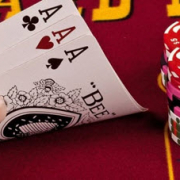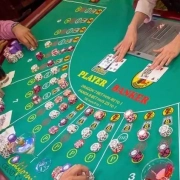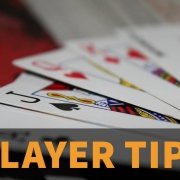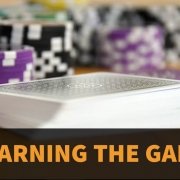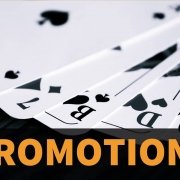What is the Optimal Strategy for Three Card Poker
Playing Three Card Poker is Easy and Fun. You are dealt three cards and the dealer is dealt three cards. The object is to have your three card poker hand to beat the dealer’s three card poker hand. You first make an Ante bet. After receiving your three card hand, you can surrender your hand and Ante wager or make a Play bet equal to your Ante bet before the dealer’s hand is revealed. If you win, you win both of your bets. The Ante and Play wagers pay even money (1:1). This is how the game is played nearly everywhere, including Las Vegas.
However at the California Grand Casino, because we show you one of the dealer’s cards before you make your Play bet, you are Playing With Better Odds Than Vegas and other casinos. Seeing one of the dealer card’s also changes the correct strategy for deciding when to make your Play bet. You will want to adjust your strategy so you can maximize your opportunity to win.
You are also playing against other players, not the casino. So at the California Grand Casino you have the opportunity to wager on the dealer hand if you want to do so.
3 CARD POKER – THE BASICS
Let’s start with a few basics. If you bet and the dealer does not have Queen or better, the dealer does not play; you win your Ante bet and your Play bet pushes (neither wins nor loses), even if the dealer’s hand beats your hand. If the dealer has Queen high or higher then you must beat the dealer to win. If you win, you’re paid on both your Ante bet and Play bet. If you lose, the dealer takes both bets.
The ranking of most hands is the same as in Poker except you are using only three cards and a straight is higher than a flush. So a mini-royal flush (AKQ) and straight flush are at the top of the hand rankings, followed by three of a kind, straight, flush, pair, and high card. If your highest card and the dealer’s highest card are the same, the tie is broken by the second-highest card, then the third highest card. If your hand and the dealer’s hand are exactly the same, you tie and the bets push.
BASIC 3 CARD POKER STRATEGY
The usual strategy for when to make the Play wager is to bet whenever you have Queen-6-4 or better, including any time your high card is an Ace or a King, no matter how high your other two cards are, and also anytime your hand is Q-7 or better, regardless of your third card. Fold if your hand is not at least that high. If your high card is a Jack or lower, fold, no matter how high your other two cards are.
MODIFIED THREE-CARD POKER STRATEGY WHEN YOU KNOW ONE OF THE DEALER’S CARDS
When you have the advantage of seeing one of the dealer’s cards, you should change your basic strategy. If the dealer card is:
- A Jack or Lower = Always Make a Play Bet. The odds that the dealer hand won’t qualify or will be lower than yours are increased.
- Queen = Only Play with Q, 9, 2 or better. If the dealer is showing a queen, your second card now needs to be stronger.
- King = Only Play with a K, 9, 2 or better. The same logic applies here. You need at least the same high card as the dealer and a stronger second card better than the average card value.
- Ace = Only Play with an A, 9, 2.
You also have the option of playing the hand house-way. This takes all the guess work out deciding when you should play. To play your hand house way, you put up your Ante and your Play bet, and the hand will be played according to the strategy outlined above.
OPTIONAL BONUS WAGERS
One of the exciting aspects of Three Card Poker is the opportunity to win large amounts through optional bonus wagers. You can win up to 1,000 times your wager on a bonus bet. There are two bonus bets: the Pair Plus bonus and the 6 Card bonus.
The Pair Plus bonus is based on the three cards in your hand. If you’re dealt a pair or better in your three cards, you win the Pair Plus bonus wager. The amount you win depends on what type of hand you are dealt.
The 6 Card bonus looks at the three cards in your hand and the three cards in the dealer’s hand. If, after combining the 6 cards, you can make a poker hand of three of a kind or better, you win the 6 Card bonus wager. The amount you win depends on what type of poker hand you can make with the six cards.
MONEY MANAGEMENT IN THREE CARD POKER
We want you to have a good time when you are here. When playing you should always think about money management. Your bet sizes should be relative to your bankroll. For example if you are playing win a $300 bankroll you should probably only make bets of $10-$20 per hand to make your play opportunities last longer. You should also think about win and loss limits. This means if you win you leave with your winnings and if you lose you do not lose more than you can afford.
If you want more information about how to play Three Card Poker, don’t hesitate to come to the California Grand Casino in Pacheco and ask a staff member. We are more than happy to explain any of our action-packed games.

